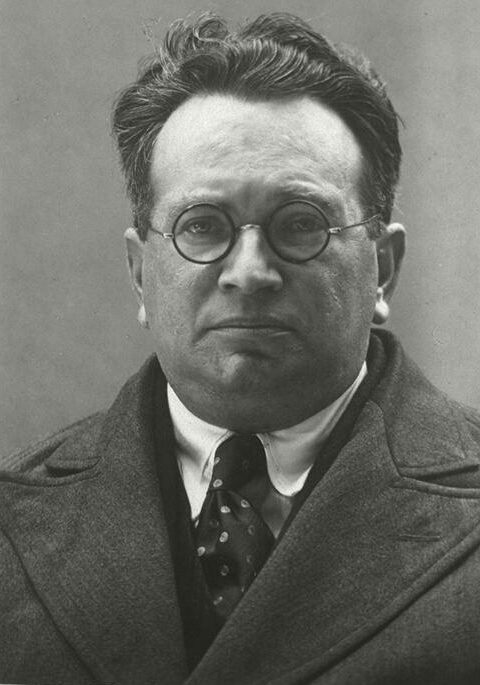
The Enduring Promise of Multinationalism: Hans Kohn’s Habsburg Legacies
By Adi Gordon
“I was always Austrian. Austria I loved.” (Hans Kohn’s diary, Jerusalem, 31 May 1929)
Understanding Nationalism
These are interesting times to reflect on nationalism. After more than half a century in which nationalism was considerably tamed by the memory of World War Two, by intergovernmental organizations, and through various aspects of globalization, the current decade has witnessed a clear rise of nationalism in the United States and abroad. Part of the new nationalist tide is the prevalent sense of its inevitability. It seems de rigueur nowadays to ridicule as naïve the anticipation of (even hope for) gradual transition into a post national future, in which nationalities are secondary to other allegiances. Nations, it is claimed, have always existed, and nationalism (and even ethno-nationalism) is simply part of human nature. But is it so?
Hans Kohn (1891-1971), the Prague-born founding father of Nationalism Studies, insisted as of the interwar years, that nationalism is not innate. Kohn, who moved to the United States in the 1930s, was a politically engaged scholar, whose theory of nationalism made a significant impact in shaping western debates during the Cold War.[i] Nationalism, he argued, is first and foremost “a state of mind,” and a modern one at that.[ii] Nationalism, as a mass phenomenon, he insisted, was simply inconceivable in the premodern world and its centralized states. It was only in the modern world—when nationalism became possible and then inevitable—that the past was inaccurately cast along clear national lines. The most memorable of Kohn’s many books, The Idea of Nationalism (1944), was a pathbreaking study precisely of that transition from the pre-national past to “the Age of Nationalism.”
By theorizing nationalism, Kohn clearly hoped to tame it. By claiming the modernity of nations, he countered the insistence on a well-defined national collective going back to time immemorial. Further, if the national sentiment was created by a certain historical context, another historical context may replace it with other more modern identities and political allegiances. In other words, historicizing nationalism restrains its license. In the second half of the 20th century Kohn’s approach was adopted, developed and popularized by a younger cohort of scholars—such as Eric Hobsbawm, Ernest Gellner, and Benedict Anderson—who spoke of nations and nationalism as “imagined communities” with “invented traditions.”
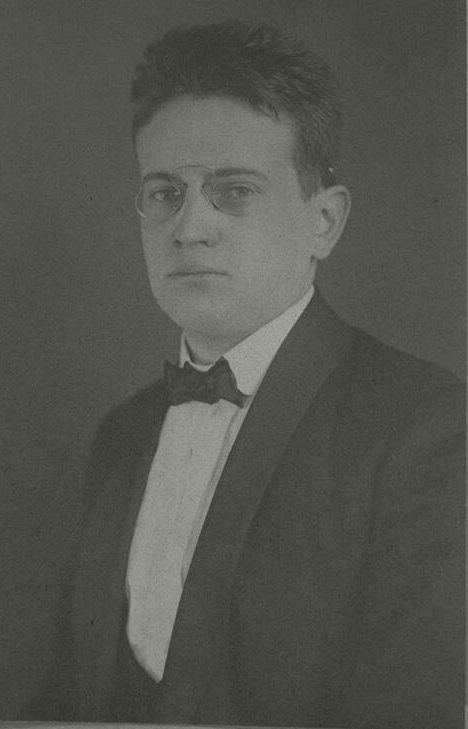
Hans Kohn. Courtesy of the Leo Baeck Institute, New York.
A Growing, Unrelenting Problem
Yet, Kohn did not always see nationalism as a problem. As a matter of fact, as a youth in Habsburg Prague, before World War One, it was nationalism—Zionism, specifically—that offered him an authentic answer to the problem of his Jewish identity. It was the Great War—his own war experience (as soldier and a POW), and then the collapse of the Habsburg Empire, the rise of the nation-state model—which made him view nationalism as a problem. Indeed, he saw it as an existential threat if not curbed. Interestingly, however, Kohn did not break with Zionism immediately. Instead, moving to Palestine in the 1920s, he and a group of like-minded people tried to steer Zionism away from the nation-state model, advocating for a binational Palestine instead, with a shared government based on complete political equality for the two nationalities, Arabs and Jews. In 1929, however, Kohn abandoned all hope for transforming Zionism, and broke with the movement. This break, he wrote, “gave me a better understanding of the pitfalls and self-deception inherent in most national movements.”[iii] It was during and after a slow and painful break with his own national movement—the Zionist movement—that Kohn emerged as a student of nationalism. In the 1930s and 1940s, as Kohn’s scholarship gained notoriety, Nazism transformed the nature and purpose of discussions about the essence of nationalism. Contemporaries needed to know why German nationalism deteriorated into Nazism and whether all nationalisms had a similar potential. Kohn’s response was his influential distinction between (malignant) ethnic and (benign) civic nationalisms, which dominated his writing henceforth. Only civic nationalism, Kohn asserted, retained a universal horizon and an innate propensity to form federations greater than itself. Kohn identified civic nationalism as “Western,” and ethnic nationalism as “Eastern,” and so, by the 1950s, his nationalism theory could seamlessly fuse with Cold War theories of totalitarianism, modernization, and a concept of a bipolar global conflict. Significantly, Kohn’s American Nationalism distinguished US nationalism from all others, arguing that the former “was not founded on the common attributes of nationhood—language, cultural tradition, historical territory or common descent —but on an idea, which singled out the new nation among the nations of the earth.” The United States for him was the “most ‘western’ nation” embodying civic nationalism.[iv]
Different chapters and aspects of Kohn’s life, then, made him ask different questions about nationalism at different times: the ambiguous Jewishness as a child before the war; his wartime experiences and especially as a POW; his encounter with the realities of colonialism in Central Asia; his entanglement in the Russian Civil War; his break with Zionism in the 1920s, and; Nazism and the Holocaust (in which his brother was murdered). Each biographic aspect, in its turn, added an important twist to his evolving understanding of nationalism. While these experiences made him ask new questions about nationalism, it is noteworthy that many of his responses were grounded in the Austria of his childhood.
“On the Way to becoming a Truly Multinational State”
Kohn was born and raised in multiethnic Habsburg Prague, where Czechs, Germans, and Jews still lived side by side. But the ethnic groups did not only live side by side: for more than two generations, Czech and German nationalists in his hometown had been engaged in a “bitter, implacable struggle.” It was part of the broad nationality problems of the late Habsburg monarchy:” . . .in Prague the two national groups lived strictly separated lives. … In all fields of life and activity there reigned a voluntary segregation, a kind of tacitly acknowledged ‘iron curtain’ which separated two worlds living side by side, each one self-contained, scarcely communicating.”[v] Yet ultimately, Kohn found Prague enriched by this multiethnic composition: “This plurality of national civilizations and their clash and competition gave to Prague a cosmopolitan and culturally stimulating character.”[vi] The formative experience, then, was a complex one, merging the realities of coexistence and segregation, of ethnic hostility kept in check by some kind local or supranational identity, which was ingrained in him: “Prague was my home, the Austrian monarchy my fatherland, and, not unreasonably, I felt a sentimental loyalty toward both.”[vii]
Kohn described the last days of the empire not so much with nostalgia but with melancholy over needlessly missed opportunities. The Austria of his childhood, he wrote, was “on the way to becoming a Vielvölkerreich, a truly multinational state. Yet the nationalist groups in Austria, eager for the panoply and power of full sovereignty, and equally eager to achieve dominant position at the expense of other nationalities, continued to complain and press for special privileges,” and under this pressure “the monarchy disintegrated.”[viii]
That late-Habsburg promise of “a truly multinational state” informed both his political prescriptions and theory of nationalism in the years to come. Uniquely influential was the Austro-Marxist outline for a multinational Austria, which also included the key component of non-territorial national autonomies. Karl Renner (the future president of Austria) offered a classic account of this “Personality Principle” in 1899: “The nations should be constituted not as territorial entities but as personal associations, not as states but as peoples, not according to age-old constitutional laws, but according to living national laws.”[ix] The inclusion of non-territorial national autonomies was uniquely applicable for the territorially diffused Jewish collective.
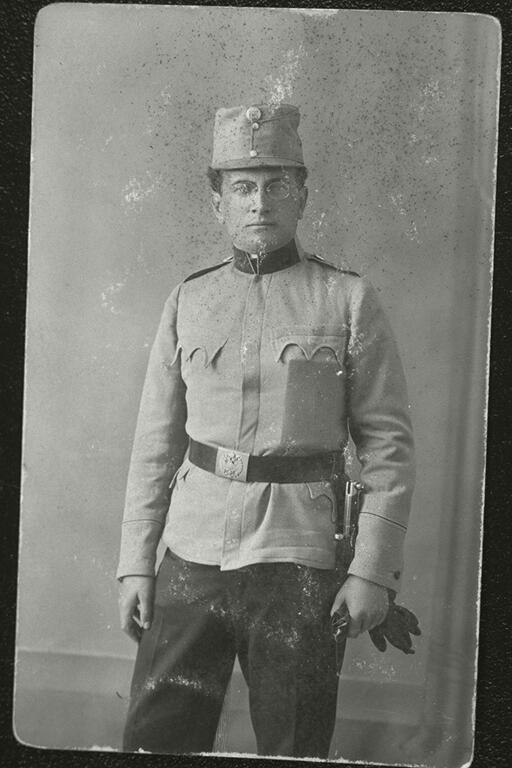
Hans Kohn. Courtesy of the Leo Baeck Institute, New York.
Answers from Austria
This political model captured Kohn’s imagination at a time in which most of the world was drifting in the other direction, toward the nation-state model. It informed his unrealistic ruminations as a POW in November 1916: “In my dreams I imagine the shape of the future as follows: Austria annexes the territory of Poland, Lithuania and Volhynia … and Rumania.” This vast new empire “would be transformed federatively into an intra-Austrian complex of Hungarians, Czechs, Polish, Lithuanians, Ukrainians, Romanians, and South Slavs.” And in this Greater Austria, Jews “like all national minorities, would have their own national assemblies (Kurien) with certain communal and educational autonomy—[and indeed] would constitute a unifying glue [of the new Great Austrian federation].”[x]
Kohn applied this model more concretely in an entirely different settings: that of Zionism in Palestine. As early as the summer of 1919 Kohn wrote the essay “On the Arab Question,” in which he urged his fellow-Zionists to understand that “once there will be a Palestinian state, [. . . it] will not be a national state (Nationalstaat) for an indefinite period, but a multinational one (Nationalitätenstaat).”[xi] Zionism, he insisted, must avoid the ethnocentric path taken by the successor states in Central Eastern Europe. Instead, faced with the Arab nation in Palestine, Zionism could work hand in hand with the Arab population for the creation of a multinational—or, rather, a binational —state: one “must give both Jews and Arabs the broadest autonomy and self-determination so as to diminish friction”; one has to establish the political mechanism that would enable the coexistence of “two nonterritorial, noncoherent, sovereign national communities (zwei unterritoriale, unzusammenhängende souveräne Nationalgemeinschaften).” Kohn applied here the Austrian Marxist prescription of national and cultural autonomy on the nonterritorial basis of the “personality principle.”[xii]
Even as he argued with German expansionists only months before Hitler’s “seizure of power,” Kohn reiterated his prescription of multiethnic and multireligious federations: “It is precisely German history,” Kohn stated, while relying on the work of right-wing geopoliticians, “that corresponds to an extensive interlaced federated state.” This great German federation, Kohn suggested, could secure its bright future precisely through inner diversity: “Only a German empire that grants a living space (Lebensraum) to minorities of religion and race and unites them with the German [element] in fertile symbiosis could take up global prestige and influence. Only such a Germany could become the heart of Europe.”[xiii]
Instead of abandoning this agenda in a world that was obviously going in the opposite direction, Kohn took this agenda a giant step further during World War Two. In February 1940, he published a sort of manifesto—the essay “The World Must Federate! Isolation versus Cooperation.”[xiv] His key argument was this: since “Fascism is essentially an exaggerated form of nationalism,” it “cannot be answered by more nationalism. It can be answered only by bold steps towards international cooperation.” With considerable wishful thinking, Kohn then pointed to “the Franco-British defensive alliance” as a first step toward a “system of collective security” and eventually “a system of federal union.” He believed that voluntary federal union should be open to all states, and that beyond the member states’ commitment to observe peaceful relations and defend fellow members of the union, the federation “must be built upon the principle of the equality of all individuals within the states, and of all states and peoples within the federation.”
In an essay from that same year, “The Legacy of the Habsburgs,” Kohn explicitly linked the late-Habsburg plans for multinational federalization to the challenges of world order after the war’s end: “Austria’s fate and her end have become symbolic of Europe’s destiny,” for “the urgent problem before Central Europe in the period between the two wars of 1914 and 1939 was the same as the Austrian problem had been at the beginning of the twentieth century, and will be the same after the present war—the problem of federation of equal peoples, not in submission and uniformity, but in freedom and tolerance. In her best moments Old Austria had shown in a very imperfect form, as an embryonic promise, the possibility of such a federation without brutality or domination, without exclusiveness or exclusivism.”[xv]
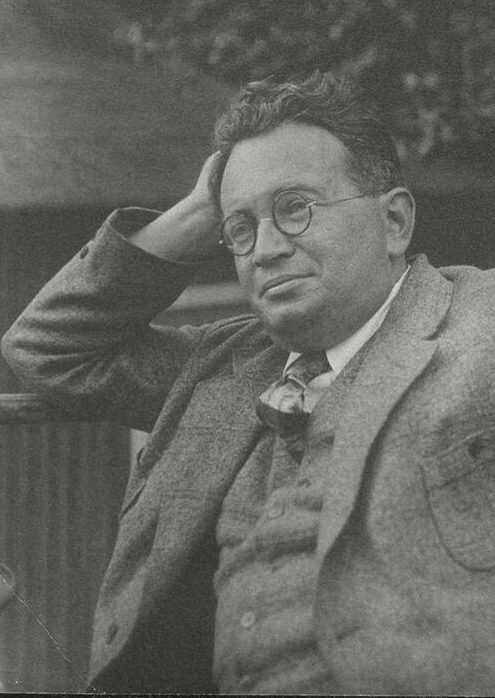
Hans Kohn, Courtesy of the Leo Baeck Institute, New York.
Conditions Pointing Beyond the Nation
More often than not, people were unconvinced by Kohn’s suggestions: most Zionists aspired nothing short of a Jewish nation-state; most postwar Europeans, after years of occupation, “came out of the war too attached to their nation-states to allow federalist ideas to get very far.”[xvi] But Kohn’s internationalism and multinationalism were never grounded in the wishes of his contemporaries, but in the challenges his contemporaries faced. It was precisely the brutalization of the national conflict in Palestine which necessitated binationalism. It was precisely the horrors of World War Two and the risk of nuclear annihilation which necessitated postwar internationalism. Based on his understanding of nationalism as emerging out of specific modern conditions, he believed that new opportunities and new historical conditions would enable, and then necessitate, the transcendence beyond the nation. While the rumors about the end of nationalism were greatly exaggerated, we should also have the humility to acknowledge that Globalism too is far from dead. The ecological crisis of climate change and the global COVID-19 pandemic are clear reminders that our current global threats will be solved only beyond the nation.
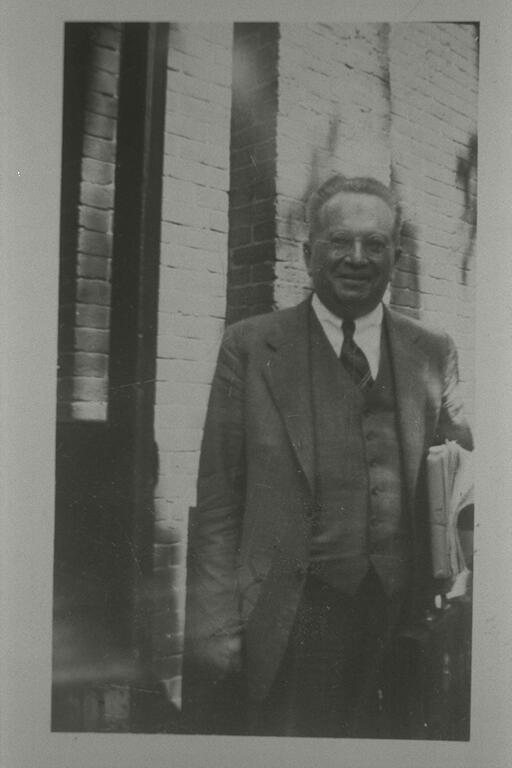
Hans Kohn. Courtesy of the Leo Baeck Institute, New York.
Author Biography
Adi Gordon, Associate Professor of History at Amherst College, is a scholar of European and Jewish intellectual history. He is the author of In Palestine: In a Foreign Land (Jerusalem: Hebrew University Magnes Press, 2004 [Hebrew]), of Brith Shalom and Bi-National Zionism (Jerusalem: Carmel Publishing House, 2008 [Hebrew]), and, more recently, of Toward Nationalism’s End: An Intellectual Biography of Hans Kohn (Waltham: Brandeis University Press, 2017). His current book project deals with intellectuals of the antidemocratic far right in the Weimar Republic and their concepts of Jewish difference.
Further Reading
- Gordon, Adi. Toward Nationalism’s End: An Intellectual Biography of Hans Kohn. Waltham, MA: Brandeis University Press, 2017.
- Kohn, Hans. The Idea of Nationalism: A Study in Its Origins and Background. New York: The Macmillan Company, 1944.
- Kohn, Hans. Living in a World Revolution: My Encounters with History. New York: Trident, 1964.
- Ozkirimli, Umut. Theories of Nationalism: A Critical Introduction. London: Palgrave Macmillan, 2017.
- Spector, Scott. Prague Territories: National Conflict and Cultural Innovation in Franz Kafka’s Fin de Siècle. Berkeley, CA: University of California Press, 2002.
Notes
[i] Adi Gordon, “The Need for West: Hans Kohn and the North Atlantic Community,” Journal of Contemporary History Vol. 46, no. 1 (2011): 33-57.
[ii] Hans Kohn, World Order in Historical Perspective (Cambridge, MA: Harvard University Press, 1942), 93. See also Kohn, The Idea of Nationalism: A Study in Its Origins and Background (New York: The Macmillan Company, 1944), 10.
[iii] Hans Kohn, Living in a World Revolution: My Encounters with History (New York: Trident, 1964), 53.
[iv] Hans Kohn, American Nationalism: An Interpretative Essay (New York: Macmillan, 1957), 8.
[v] Kohn, Living in a World Revolution, 10.
[vi] Kohn, Living in a World Revolution, 7.
[vii] Kohn, Living in a World Revolution, 3.
[viii] Kohn, Living in a World Revolution, 18.
[ix] Karl Renner, “State and Nation,” in Modernism: The Creation of Nation States, edited by Ahmet Ersoy, Maciej Górny, and Vangelis Kechriotis (Budapest: Central European Press, 2010), 104.
[x] Kohn’s war diary, Hans Kohn Collection, Leo Baeck Institute Archives, box 23, folder 1.
[xi] Hans Kohn, “Zur Araberfrage,” Der Jude 4, no 12 (1919–20): 567–69. An English translation was published as Kohn, “The Arab Question,” in The Jews of Bohemia and Moravia: A Historical Reader, edited by Wilma Abeles Iggers and translated by Wilma Abeles Iggers, Káča Poláčková-Henley, and Kathrine Talbot (Detroit, MI: Wayne State University Press, 1992), 239–42 (240-241).
[xii] Kohn, “The Arab Question,” 241.
[xiii] Hans Kohn, “Über einige Gesichtspunkte des politischen Judenproblems in Deutschland und Europa,” Europäische Revue 8 (August 1932): 479–89.
[xiv] Hans Kohn, “The World Must Federate,” Asia, February 1940, 63–66, reprinted as Kohn, The World Must Federate! Isolation versus Cooperation (New York: Press of the Woolly Whale, 1940).
[xv] Hans Kohn, “The Legacy of the Habsburgs,” Not by Arms Alone: Essays on Our Time (Cambridge, MA: Harvard University
Press, 1940), 56–57 and 64.
[xvi] Mark Mazower. Hitler’s Empire: How the Nazis Ruled Europe (New York: Penguin Press, 2008), 566.
Published on August 3, 2021.
